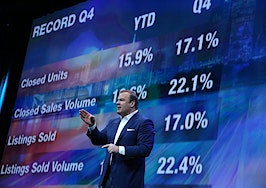New markets require new approaches and tactics. Experts and industry leaders take the stage at Inman Connect New York in January to help navigate the market shift — and prepare for the next one. Meet the moment and join us. Register here.
Former Keller Williams CEO John Davis has filed a lawsuit against real estate franchisor Keller Williams and its co-founder Gary Keller in what Davis says is an effort to restore his reputation after sexual misconduct allegations against him surfaced earlier this year and to recover $300 million in damages.
The Oct. 27 complaint also names former KW President Josh Team and Inga Dow, the CEO of multiple Keller Williams offices who lodged the allegations against Davis in March, as defendants.

John Davis | Keller Williams
In the suit, Davis alleges he resigned from KW because of a disagreement with Keller over a business strategy that he believed would bring in less income to Keller Williams offices, and that Keller and Team responded by smearing him and withholding Dow’s accusations from him when he was negotiating the sale of his KW market center regions after his resignation, resulting in tens of millions in financial losses.
Davis declined to comment for this story, but his spokesperson Paul Omodt told Inman that a non-disparagement clause in Davis’ separation agreement with Keller Williams had expired in early November, and therefore Davis was now defending himself against the company’s alleged actions.
The suit seeks $300 million in damages not only for Davis’ loss of career opportunities after leaving Keller Williams and the losses from selling his businesses at allegedly reduced prices, but also for “the pain and suffering that John’s gone through,” according to Omodt.
“There is a price to ruin someone’s life,” Omodt told Inman in a phone interview.
“We look forward to the facts coming out in court,” he added.

Gary Keller | Keller Williams
In an emailed statement, Keller Williams’ spokesperson Darryl Frost, speaking on behalf of both the franchisor and Keller, told Inman, “We are aware of the lawsuit. Mr. Davis’ attempt to involve Keller Williams in his quest to clear his name is unfortunate. As this is ongoing litigation, we do not intend to comment any further at this time.”
Also in an emailed statement, attorney Jacob Kring, speaking on behalf of Team, told Inman “Mr. Team agrees with Keller Williams that it’s unfortunate that Mr. Davis has chosen this path. We intend to vigorously defend ourselves in the court of law in this matter. And have nothing further to say at this time.”
Dow did not respond to a request for comment. In a March amended complaint against KW, Keller and Davis, Dow alleged she had endured years of sexual misconduct, harassment and abuse at Davis’ hands and that Austin-based Keller Williams Realty Inc. (KWRI) did nothing to address the alleged behavior and continued to retaliate against her for reporting it.
That case is in arbitration regarding the claims against KW and Keller and was temporarily suspended pending the results of arbitration.
In his complaint filed in a U.S. District Court in Fort Worth, Texas, Davis alleges Dow made sexual misconduct allegations against him to compel Keller Williams to buy her market centers for more than their worth.
“This case arises out of the perverted use of the judicial process by Dow, a Keller Williams franchise owner who mismanaged her businesses and then sought to sell them for more than their true value,” the complaint reads.

Inga Dow
“When she was unsuccessful, Dow then falsely accused Davis, a well respected and highly successful (now former) Keller Williams CEO, of rape and/or sexual assault in an effort to try and use the judicial process as a means to coerce the sale of her businesses on her terms, while at the same time muddying up Davis’s reputation for personal gain.”
According to Omodt, a tape surfaced during the discovery process in Dow’s suit this summer in which Dow told KW lawyers that Davis never “raped” her. The complaint mentions the recording but does not elaborate.

Josh Team |Keller Williams
Attorneys for Davis allege that Dow disclosed her “malicious and false allegations against Davis” to Keller Williams, Keller and Team while Davis was negotiating the sale of his own businesses to Keller Williams and related entities, but that the three “fraudulently omitted” those allegations from Davis to compel him to sell his businesses to Keller Williams at less than their worth and also to hurt Davis’ reputation.
The complaint alleges that Keller Williams, Keller and Team “falsely insinuat[ed]” that Davis was fired from the company because of Dow’s allegations. Rather, the complaint says Davis resigned because he disagreed with Keller about establishing across-the-board market caps for franchises, which he felt were “likely to significantly damage profitability for franchise owners and agents.” Davis alleges this is what happened to Dow’s businesses.
“It was Keller’s strategy plan which, in part, caused Dow’s businesses to decrease in value and was the catalyst to Dow’s filing of a federal complaint on false pretenses to seek a more favorable buyout,” the complaint says.
The complaint details what it described as a “voluntary, consensual and non-exclusive sexual relationship” between Davis and Dow over about six years, between 1998 and 2004, after which they allegedly mutually and amicably agreed to end the relationship when Dow informed Davis she was seeing her now-husband, Robert Dow.
Davis joined a company owned by Keller, Advantage Mortgage, in October 1996 and subsequently rose through the ranks to eventually become Keller Williams’ president and CEO in April 2017. The complaint alleges that Davis’ strategy “furthered profitability for franchisees and agents,” that Keller wasn’t pleased by the accolades Davis subsequently received and that Keller proposed a new strategy that Davis opposed.
“Keller, the founder of Keller Williams, did not appreciate the attention Davis received for his successful management strategy because it took the spotlight away from him, and at the end of 2017, introduced a new business strategy to universally and generally reduce market center caps, and wanted Davis to support it,” the complaint reads.
“Davis resisted for years. Davis tried to push back because this strategy not only hurt market centers (and ultimately agents), but it would have also hurt Davis personally. Davis supported healthy, profitable ecosystems and did not want to hurt operators who had put their faith — and invested their futures — in Keller Williams and Davis’s teachings.”
According to the complaint, a “market center cap” is the amount an agent pays to be part of the Keller Williams franchise and to work out of a particular office, called a “market center.” The fees are a portion of the agent’s commission and capped annually, according to the complaint. The market center owner sets the market center cap as part of its franchise agreement with Keller Williams.
“[I]n recommending specific and universal market center cap amounts, Keller was overstepping the franchisee’s role in leading an individually owned and operated market center,” the complaint reads.
“This could have potentially led to litigation because of the impact to market centers. Davis was unsuccessful in convincing Keller to reconsider his management strategy. Because of this conflict in strategy, Davis had no other option than to resign from his CEO position in January 2019.”
While lowering the cap could attract more agents to a market center, it can also reduce a center’s income, according to the complaint.
“To simplify, if a market center owner decides to reduce their cap by half, they have just reduced their income by half,” the complaint reads.
“They would need to then recruit double the number of productive agents to continue at the same level of profitability. If they do not recruit the number of productive agents they need, at the pace they need, they may need to reduce the leadership, space, service, and/or support they provide to agents. This may further impair their ability to recruit productive agents at the pace they need.”
The complaint alleges that Dow incorporated Keller’s strategy at her market centers, which on top of her alleged “lavish lifestyle and mismanagement,” resulted in a decrease in value.
“Dow tried to sell her market centers shortly thereafter, but because of the decrease in cash flow, largely due to the reduction in market center caps, her businesses were not worth the price that she was asking,” the complaint reads.
This is when Dow allegedly accused Davis of sexual assault within KW.
“Dow, and her attorneys, believed the false allegations against Davis and several other Keller Williams operators would cause Keller to succumb to the pressure for fear of bad publicity against his company and would lead to a more favorable sale for Dow, especially because at the time it was believed that Keller was taking Keller Williams public,” the complaint says.
“[Dow’s lawsuit is] shocking, vulgar, false, and defamatory, and intentionally designed to (1) coerce the defendants in the underlying action into a settlement to fund Dow’s exit from Keller Williams, and (2) destroy the reputations and careers of Davis and those that she envies and despises because they have excelled beyond the level Dow attained in her own career,” the complaint adds.
So far, KW has refused to settle Dow’s suit, according to Davis’ complaint.
After his resignation in January 2019, Davis negotiated a sale of his “highly profitable” Keller Williams market center regions to another KW operator, Smokey Garrett, whom Dow also named as a defendant in her lawsuit, for $46 million. But that deal was rejected by KW through Keller and Team, the complaint alleges.
“After rejecting Davis’s proposed sale of his regions to another Keller Williams operator, Keller Williams, Keller and Team left Davis no choice but to sell to Keller, and other insiders close to Keller, for tens of millions of dollars less than the previously negotiated sale, and well below their actual value,” the complaint reads.
“Keller Williams, Keller, and Team used Dow’s allegations, which they knew were malicious and false, as a sword against Davis and as a means to obtain a financial windfall through a forced and severely reduced sale of Davis’s regions,” the complaint added.
According to the complaint, KW, Keller and Team stalled for nearly two years after Davis resigned to complete his separation agreements, because they feared a competitor might hire him but then sped up the process after learning of Dow’s accusations, because they knew that the accusations would likely prevent him from being employed by a rival.
“Since Davis’s ‘departure’ from Keller Williams, Keller and Team have continually engaged in a smear campaign against Davis,” in alleged violation of the anti-disparagement clause in Davis’s separation agreement with Keller Williams, according to the complaint.
The allegations against Davis have ruined his reputation in the real estate industry and have caused and will cause Davis to lose career opportunities adding up to more than $300 million in losses, the complaint reads.
Davis “had every intent of reentering the executive workforce” after leaving KW, but because of Dow’s allegations, which allegedly “instantly obliterated” Davis’ good name and reputation and rendered him “completely radioactive as a future executive,” his odds of getting another job with a similar compensation package “has sorely diminished,” according to the complaint.
“Davis has sat by watching others of similar or lesser experience and reputation accept compensation packages worth over $50,000,000 and is in fear that the reputational harm caused by Dow’s malicious and false allegations, and Keller Williams’s, Keller’s and Team’s fraudulent omissions and smear campaign, have severely decreased his opportunity to receive similar offers,” the complaint reads.
The complaint makes clear that Davis was not happy about the court’s decision to send Dow’s claims against Keller Williams into arbitration.
“This decision puts Davis in a terrible position because it allows Dow’s false and malicious claims against Davis to remain unresolved, possibly in perpetuity, and further harm his reputation and ability to earn a living commensurate with his previous position,” the complaint reads.
“Moreover, the arbitration may lead to a resolution of the matter without Davis being a party, and the arbitration decision could potentially adversely affect Davis’s ability to seek redress for the harms caused by Dow’s false and malicious claims.
“Davis, having been placed in an extremely precarious and unfair position, has no choice but to bring this suit to not only seek redress for the wrongful conduct by Dow, Keller Williams, Keller and Team, but also to restore his reputation and clear his good name.”
Davis’ suit alleges abuse of process and tortious interference with prospective relations against Dow; fraud by omission, breach of contract, civil conspiracy, tortious interference with contract, breach of fiduciary duty, and breach of good faith and fair dealing against Keller; fraud by omission and breach of contract against Keller Williams; and fraud by omission, civil conspiracy and tortious interference with contract against Team.
The suit demands a trial by jury.












